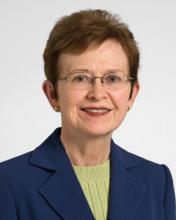To varying degrees, vulvovaginal atrophy affects an estimated 20%-40% of menopausal women, but the name of the condition fails to appropriately characterize the range of associated signs and symptoms that women may experience.
Representatives from the North American Menopause Society (NAMS) and the International Society for the Study of Women’s Sexual Health, Inc. (ISSWSH) propose a new term: genitourinary syndrome of menopause, or GSM.
Earlier this year, the two organizations convened a 2-day consensus conference to consider what an appropriate term would encompass. The goal of that conference, according to Dr. Margery Gass of the Cleveland Clinic Center for Specialized Women’s Health and the executive director of NAMS, was to identify a term that was descriptive, comprehensive, and suitable for professionals, consumers, and the media.
Participants reviewed the symptoms and signs of genitourinary aging and the available relevant data, and decided on a number of components that should be covered by the new nomenclature, including the affected anatomy, descriptive factors, problems caused by the condition, and context with respect to life phase, she said in an interview.
Dr. Gass and Dr. David J. Portman, director of the Columbus Center for Women’s Health Research and an adjunct instructor at Ohio State University, Columbus, cochaired the consensus conference. They presented the conclusions from the conference at the annual meeting of the North American Menopause Society in October.
"Several concerns have forced the issue of a name change for this condition," Dr. Gass said, noting that persistent societal resistance to openly discussing women’s sexuality and sexual health is not the least among them.
The word "vagina," for example, still can’t be uttered in many media outlets, she explained. Additionally, the term "atrophy" has unpleasant connotations that aren’t necessarily reflective of the experience of women affected by the condition, she noted.
"In fact, atrophy in and of itself is a natural part of aging – something many women experience – and is not necessarily a problem; some women with atrophy experience no symptoms, while others experience significant symptoms.
"We feel that the name we’re putting forward (genitourinary syndrome of menopause) very accurately describes the parts of the body that are involved – namely the genital system and the lower urinary tract," she said.
The use of the word "syndrome" further allows for a diagnosis based on the range of symptoms women may experience, and doesn’t limit the condition to specific symptoms.
"This is not a disease or a deficiency, so we think ‘genitourinary syndrome of menopause’ is a neutral term that would be acceptable, Dr. Gass said.
A change in the nomenclature could potentially open the door to more productive, health-promoting dialogue. During his presentation at the NAMS meeting, Dr. Portman explained how a term that is more acceptable to patients and the media could have the power to start the conversation, change attitudes, and promote understanding and acceptance of more open communication. He used male sexual dysfunction as an example.
In 1992, a National Institutes of Health consensus development panel determined that the term "erectile dysfunction" was preferable to the term "impotence." Indeed, along with the subsequent approval of Viagra and other drugs related to male sexual health, the term "erectile dysfunction" is now widely used in advertising, promoted by politicians and celebrities, and openly discussed in the community, he said.
In contrast, open discussion about women’s sexuality and sexual health remains constrained. In fact, in a survey of more than 1,000 women – including 330 women aged 60-65 years – 75% "completely agreed" that society constrains the sexual expression of "women my age more so than men my age." Nearly as many completely agreed that society is more accepting of discussion around men’s physical sexual problems than women’s physical sexual problems. More than half completely agreed that "society would prefer to believe that women my age do not have sex."
The use of more "socially acceptable" terminology (the word "penis," like "vagina," is still not used openly, Dr. Gass noted) helped make male sexual health a mainstream topic; it is hoped that transitioning from "vulvovaginal atrophy" to "genitourinary syndrome of menopause," would have a similar effect with respect to women’s sexual health, Dr. Portman said.
GSM would be defined as "a collection of symptoms and signs associated with decreased estrogen levels that can involve the labia majora/minora, vestibule/introitus, clitoris, vagina, urethra, and bladder," conference attendees agreed.
It is a syndrome for which treatment is indicated if symptoms are bothersome; treatment should be individualized based on the severity of symptoms and the woman’s preference after discussion of treatment options and risks and benefits.


